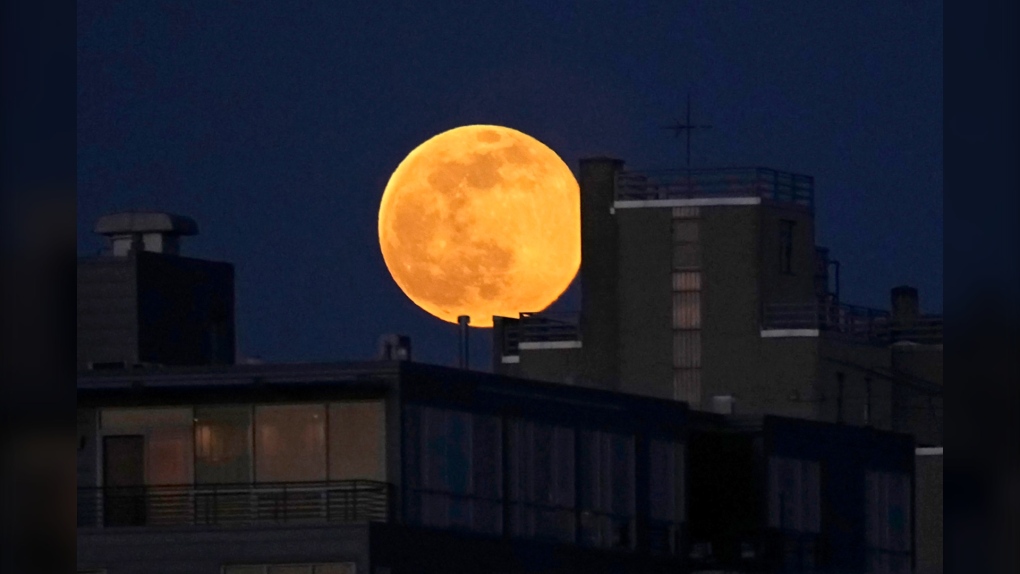
B.C. tenants evicted for landlord's use after refusing large rent increase to take over neighbouring suite
Ashley Dickey and her mother rented part of the same Coquitlam duplex in three different decades under three different landlords.
February's full snow moon, which first appeared this weekend, will light up the sky over the next two nights, with the spectacle already reaching full illumination on Sunday morning. But this year’s full moon was smaller than those of recent years.
This month's full moon is considered a “micromoon.”
According to NASA, a full moon is the result of the moon appearing opposite of the sun in Earth-based longitude, which reveals the moon’s dayside. A full moon occurs after the lunar cycle has been completed (which takes 29.5 days).
The “micromoon” status of February’s full moon is a result of the moon being closer to the apogee, the point of orbit farthest from Earth.
Since the Earth is currently about 405,000 kilometres away, the moon will appear about 14 per cent smaller than full moons closer to the perigee, or point of orbit closest to Earth. Skygazers may remember the supermoon of July 2022, in contrast, when the moon was close to the perigree.
Observers, however, are unlikely to notice the difference this month without equipment.
As NASA explains on its website, the rising full moon will be 11 degrees above the east-northeastern horizon, offering wider illumination to other astronomical sights.
Three planets, including Mars, Jupiter and Venus, are all projected to remain visible until Tuesday morning.
The bright star Capella could also be seen in this lunar-illuminated sky.
To get the best view, astronomers suggest finding locations void of too much light pollution.

Ashley Dickey and her mother rented part of the same Coquitlam duplex in three different decades under three different landlords.
A man who fell into a crevasse while leading a backcountry ski group deep in the Canadian Rockies has died.
A new survey by Dalhousie University's Agri-Food Analytics Lab asked Canadians about their food consumption habits amid rising prices.
MPP Sarah Jama was asked to leave the Legislative Assembly of Ontario by House Speaker Ted Arnott on Thursday for wearing a keffiyeh, a garment which has been banned at Queen’s Park.
Charlie Woods failed to advance in a U.S. Open local qualifying event Thursday, shooting a 9-over 81 at Legacy Golf & Tennis Club.
As Donald Trump was running for president in 2016, his old friend at the National Enquirer was scooping up potentially damaging stories about the candidate and paying out tens of thousands of dollars to keep them from the public eye.
After Prime Minister Justin Trudeau said the federal government would still send Canada Carbon Rebate cheques to Saskatchewan residents, despite Saskatchewan Premier Scott Moe's decision to stop collecting the carbon tax on natural gas or home heating, questions were raised about whether other provinces would follow suit. CTV News reached out across the country and here's what we found out.
A Montreal actress, who has previously detailed incidents she had with disgraced Hollywood producer Harvey Weinstein, says a New York Court of Appeals decision overturning his 2020 rape conviction is 'discouraging' but not surprising.
Caleb Williams is heading to the Windy City, aiming to become the franchise quarterback Chicago has sought for decades.

Mounties in Nanaimo, B.C., say two late-night revellers are lucky their allegedly drunken antics weren't reported to police after security cameras captured the men trying to steal a heavy sign from a downtown business.
A property tax bill is perplexing a small townhouse community in Fergus, Ont.
When identical twin sisters Kim and Michelle Krezonoski were invited to compete against some of the world’s most elite female runners at last week’s Boston Marathon, they were in disbelief.
The giant stone statues guarding the Lions Gate Bridge have been dressed in custom Vancouver Canucks jerseys as the NHL playoffs get underway.
A local Oilers fan is hoping to see his team cut through the postseason, so he can cut his hair.
A family from Laval, Que. is looking for answers... and their father's body. He died on vacation in Cuba and authorities sent someone else's body back to Canada.
A former educational assistant is calling attention to the rising violence in Alberta's classrooms.
The federal government says its plan to increase taxes on capital gains is aimed at wealthy Canadians to achieve “tax fairness.”
At 6'8" and 350 pounds, there is nothing typical about UBC offensive lineman Giovanni Manu, who was born in Tonga and went to high school in Pitt Meadows.
 The full snow moon rises over Milwaukee, Sunday, Feb. 5, 2023. The next full moon, the worm moon, will be on March 7. (Mike De Sisti/Milwaukee Journal-Sentinel via AP)
The full snow moon rises over Milwaukee, Sunday, Feb. 5, 2023. The next full moon, the worm moon, will be on March 7. (Mike De Sisti/Milwaukee Journal-Sentinel via AP)